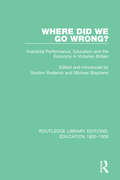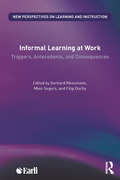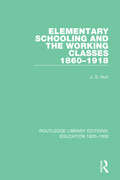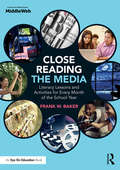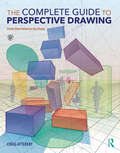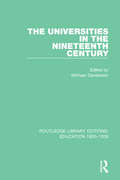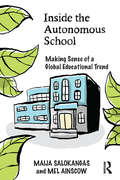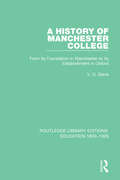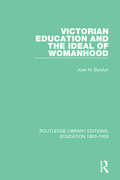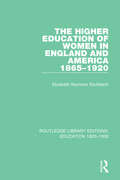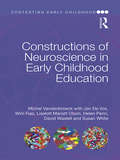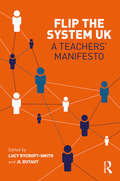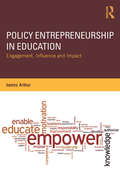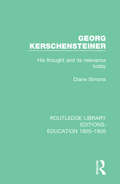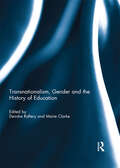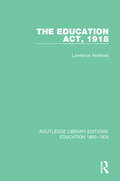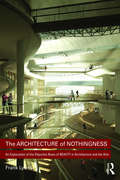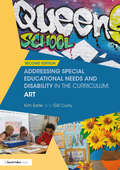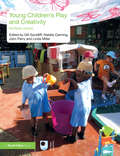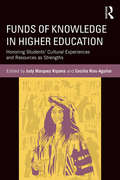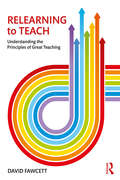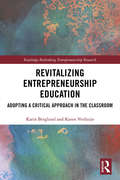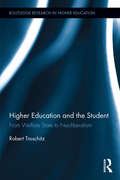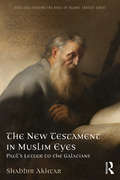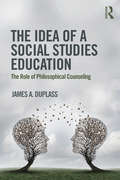- Table View
- List View
Where Did We Go Wrong?: Industrial Performance, Education and the Economy in Victorian Britain (Routledge Library Editions: Education 1800-1926 #12)
by Michael Stephens Gordon RoderickThis series of edited papers, first published in 1981, examines Britain’s industrial and commercial performance in the 19th and 20th centuries against the background of the development of state education. The performance of certain key 19th century manufacturing industries are analysed and the reasons for their relative decline in the face of foreign competition is assessed. This title will be of interest to students of history and education.
Informal Learning at Work: Triggers, Antecedents, and Consequences (New Perspectives on Learning and Instruction)
by Filip Dochy Mien Segers Gerhard MessmannInformal Learning at Work reflects the growing interest in changing the way the workplace encourages and enhances learning and professional development. Due to societal, economic, and technological developments, organisations face the pressure of growing knowledge-intensity and the need for innovations. As a result, employees are expected to adapt to new situations and constantly update their skillsets within an increasingly challenging environment. This book brings together cross-disciplinary perspectives from leading international researchers, drawing on a range of theoretical and empirical studies. <P><P>Extensively researched and expertly edited, this new addition to the EARLI New Perspectives on Learning and Instruction series outlines the starting points for future research, and highlights the benefits and implications for those aiming to foster informal learning at work, covering areas such as: <li>professional judgement <li>improving the structure of work tasks <li>facilitating innovative work behaviour <li>the place of informal learning within teaching <P><P>Informal Learning at Work presents original quantitative and qualitative studies as well as integrative analyses of worldwide research and is an invaluable introduction to this highly topical subject.
Elementary Schooling and the Working Classes, 1860-1918 (Routledge Library Editions: Education 1800-1926 #8)
by J. S. HurtThis study, first published in 1979, analyses the attitude of various income and occupational groups to elementary schools both before and after the introduction of compulsory school attendance. It also discusses the efforts made by voluntary organisations to provide school meals, as well as examining the quality of the meals themselves, before the enactment of remedial legislation in the early twentieth century. This title will be of interest to students of history and education.
Close Reading the Media: Literacy Lessons and Activities for Every Month of the School Year
by Frank BakerTeach middle school students to become savvy consumers of the TV, print, and online media bombarding them every day. In this timely book copublished by Routledge and MiddleWeb, media literacy expert Frank W. Baker offers thematic lessons for every month of the school year, so you can engage students in learning by having them analyze the real world around them. Students will learn to think critically about photos, advertisements, and other media and consider the intended purposes and messages. Topics include: Helping students detect fake news; Unraveling the messages in TV advertising; Looking at truth vs propaganda in political ads and debates; Revealing how big media influences the news we read; Understanding how pictures changed America during the Civil Rights Movement; Exploring the language of film and the symbols of costume design; Thinking about how media appeals to our emotions; Examining branding, product placement, and the role of celebrity; Reading and interpreting iconic news images; And much, much more! In addition, the book’s lesson plans contain connections to key standards and step-by-step activities you can use immediately. With this practical book, you’ll have all the tools and ideas you need to help today’s students successfully navigate their media-filled world.
The Complete Guide to Perspective Drawing: From One-Point to Six-Point
by Craig AtteberyComputers can calculate perspective angles and create a drawing for us, but the spontaneity of mark making, the tactile quality of a writing surface, the weight of a drawing instrument, and the immediacy of the human touch are sensations that keep traditional drawing skills perpetually relevant. The sensuality and convenience of the hand persists and will survive as a valuable communication tool, as will the need to accurately express your ideas on paper. As a professional, understanding the foundations of drawing, how we process images, and how we interpret what we see are principal skills. Understanding linear perspective enables artists to accurately communicate their ideas on paper. The Complete Guide to Perspective Drawing offers a step-by-step guide for the beginner as well as the advanced student on how to draw in one-point through six-point perspective and how to make scientifically accurate conceptual illustrations from simple to complex situations.
The Universities in the Nineteenth Century (Routledge Library Editions: Education 1800-1926 #13)
by Michael SandersonThis title, first published in 1975, analyses the ways in which developments in Victorian universities have shaped both the structure and the assumptions of British higher education in the twentieth century. No period of British higher education has been more full of change nor so rooted in fundamental debate than the second half of the nineteenth century. Its lasting impact makes it crucial for an understanding both of this period of Victorian social history and of the contemporary system of higher education in Britain. This title will be of interest to students of history and education.
Inside the Autonomous School: Making Sense of a Global Educational Trend
by Mel Ainscow Maija SalokangasOver recent years, education systems across the globe have experimented with the concept of the autonomous school. This takes a variety of forms and the schools involved have different titles, such as charter schools in the USA, academies in England, free schools in Sweden and independent public schools in Australia. As this radical trend in policy gains momentum, Inside the Autonomous School considers whether the model is achieving its desired aims. Drawing on evidence from an in-depth, longitudinal study of an academy located in an urban district in England, this book traces the various developments which took place in the school on its journey from ‘failing’, to achieving an inspection rating of ‘outstanding’. The authors present a rich, first-hand account of the impacts that various policies and practices have had on the autonomous school and at the same time, situate their accounts and analyses within a wider national and international context. This leads them to consider what can be done to ensure that school autonomy consistently promotes excellence and equity within education systems. A fascinating read and invaluable resource for practitioners, researchers and policy makers in the field of education, Inside the Autonomous School sheds much needed light on an increasingly established policy which is set to have far-reaching effects.
A History of Manchester College: From its Foundation in Manchester to its Establishment in Oxford (Routledge Library Editions: Education 1800-1926 #3)
by V. D. DavisThis book, first published in 1932, tells the progress of Manchester College, founded in Manchester in 1786, and since 1889 established at Oxford, as a postgraduate School of Theology and place of training for the ministry of religion. This title will be of interest to students of history and education.
Victorian Education and the Ideal of Womanhood (Routledge Library Editions: Education 1800-1926 #2)
by Joan N. BurstynThis study, first published in 1980, argues that higher education for women was accepted by the end of the nineteenth-century, and higher education was becoming a desirable preparation for teachers in girls’ schools. By accepting the opponents’ claim that higher education for women had the potential to revolutionise relations between the sexes, this fascinating book demonstrates how the relevance of the nineteenth-century serves to enhance our understanding of the contemporary women’s movement. This title will be of interest to students of history and education.
The Higher Education of Women in England and America, 1865-1920 (Routledge Library Editions: Education 1800-1926 #5)
by Elizabeth Seymour EschbachThis study, first published in 1993, traces the path of women toward intellectual emancipation from eighteenth-century precedents, through the hard-won access to college education in the nineteenth-century, to the triumphs of the early 1900s. The author compares women's experiences in both the US and England, and will be of interest to students of history, education and gender studies.
Constructions of Neuroscience in Early Childhood Education
by Jan De Vos Helen Penn Sue White Michel Vandenbroeck Dave Wastell Liselott Mariett Olsson Wim FiasThis book explores and critiques topical debates in educational sciences, philosophy, social work and cognitive neuroscience. It examines constructions of children, parents and the welfare state in relation to neurosciences and its vocabulary of brain architecture, critical periods and toxic stress. The authors provide insight into the historical roots of the relationship between early childhood education policy and practice and sciences. The book argues that the neurophilia in the early childhood education field is not a coincidence, but relates to larger societal changes that value economic arguments over ethical, social and eminently pedagogical concerns. It affects the image of the child, the parent and the very meaning of education in general. Constructions of Neuroscience in Early Childhood Education discusses what neuroscience has to offer, what its limitations are, and how to gain a more nuanced view on its benefits and challenges. The debates in this book will support early childhood researchers, students and practitioners in the field to make their own judgements about new evolutions in the scientific discourse.
Flip The System UK: A Teachers’ Manifesto
by Lucy Rycroft-Smith Jean-Louis DutautHow did we let teacher burn-out happen, and what can we do about it – before it's too late? This brave and disruptive book accurately defines the problems of low teacher morale and offers systemic, future-proof and realistic solutions to bringing hope, energy and joy back to the profession. The simple answer is staring us in the face: increase teacher agency. Our rallying cry: our profession needs a return to values of humanity, pride, and professionalism. From research literacy to a collective voice, better CPD to smarter accountability, contributors to this book demonstrate the huge scope for increased teacher influence at every level of the education sector. Education voices including Sam Twiselton, Alison Peacock, David Weston and Andy Hargreaves, supported by a broad range of academics and policy makers, vouch for increased teacher agency and stronger, more powerful networks as a means of improving practice, combatting teacher disillusionment, and radically improving UK education. This text offers an exciting and hopeful perspective on education; urging teachers to work together to ‘flip the system’ and challenging policy makers to help… or get out of the way. Chapters have been contributed by Tom Bennett, Peter Ford, Jonathan Firth, David Weston, David Williams, Zeba Clarke, Julie Smith, Dr Robert Loe, Jeremy Pattle, Debra Kidd, Steven Watson, Ross Morrison McGill, George Gilchrist, Howard Stevenson, Professor Dame Alison Peacock, d’Reen Struthers, Phil Wood, Rae Snape, Simon Gibbs, Ross Hall, Jackie Ward, Simon Knight, David Frost, Sheila Ball, Sarah Lightfoot, Andy Hargreaves, Darren Macey, Gary Farrell, Julian Critchley, Tony Gallagher, Gareth Alcott, Sam Twiselton, Jelmer Evers, Alma Harris, Michelle Jones, Natalie Scott, Deborah M. Netolicky, Jon Andrews, Cameron Paterson, Per Kornhall, Joe Hallgarten, Tom Beresford and Sara Hjelm.
Policy Entrepreneurship in Education: Engagement, Influence and Impact
by James ArthurPolicy Entrepreneurship in Education aims to build the confidence and skills of education academics in securing higher impact for their work. It offers guidance and identifies methods of capturing and measuring impact, as well as practical advice in helping academics engage policy makers and influence society with their research. Written specifically for the field of education, the book utilises domestic and international examples to illustrate those policy entrepreneurship activities which advance impact and appeal to international audiences, who are increasingly concerned with how higher education studies in education can make a difference on the ground. Combining theory and practice, the book employs a practical approach to doing policy entrepreneurship. It is a unique offering that will appeal to all who have an academic or practical interest in policy change and how to affect this.
Georg Kerschensteiner: His Thought and its Relevance Today (Routledge Library Editions: Education 1800-1926 #14)
by Diane SimonsThis book, first published in 1966, is an introduction to the life and work of Georg Kerschensteiner, the pioneer of the modern German system of vocational education, a system which is largely responsible for Germany’s remarkable industrial recovery and advancement after the Second World War. This title will be of interest to students of education and history.
Transnationalism, Gender and the History of Education
by Deirdre Raftery and Marie ClarkeIn the past decade, historians have begun to make use of the optic of ‘transnationalism’, a perspective used traditionally by social anthropologists and sociologists in their study of the movement and flow of ideas between continents and countries. Historical scholarship has adopted this tool, and in this book historians of education use it to add nuance and depth to research on gender and education, and particularly to the education experiences of women and girls. The book brings together a group of internationally-regarded scholars, who are doing important research on transnationalism and the social construction of gender, with particular reference to education environments such as schools and colleges. The book is therefore very much at the cutting-edge of theoretical and methodological advances in the history of education.This book was originally published as a special issue of the History of Education.
The Education Act, 1918 (Routledge Library Editions: Education 1800-1926 #1)
by Lawrence AndrewsThis study, first published in 1976, evaluates the important contribution of the Education Act, 1918, to the development of education in England and Wales during the twentieth century. The Act aimed to establish ‘a national system of public education available for all persons capable of profiting thereby’, and in so doing, laid the framework for the subsequent reforms in the field of education. This title will be of interest to students of history and education.
The Architecture of Nothingness: An Explanation of the Objective Basis of Beauty in Architecture and the Arts
by Frank LyonsIt is a common enough assumption that good buildings make us feel good just as poor ones can make us feel insecure, depressed or even threatened. We may instantly decide that we ‘like’ one building more than another, in the same way that without thinking we choose one work of art or music over another. But what is going on when we make these instant decisions? The process is so complex that it remains an area rarely examined, often considered unfathomable, or for some mysterious, bordering even on the spiritual. Frank Lyons seeks to unpick the complex relationships that go to make up great works of architecture, to reveal a set of principles that are found to apply not only to architecture but also to art, music and culture in general. One of the major complications at the heart of culture is that because the arts are generated subjectively, it is assumed that the finished cultural artefact is also subjective. This is a myth that this book seeks to dispel. The arts are indeed created from the personal subjective space of an individual but what that individual has to say will only be shareable if expressed in coherent (objective) form. In a nutshell, the book reverses two generally accepted positions, that the arts are subjective and that meaning is objective and therefore shared. The reversal of these seemingly common sense, but mistaken positions enables two important issues to be resolved, firstly it explains how the arts communicate through objectivity and secondly how the meaning of an object of art is never shared but always remains private to the individual. The combination of these two positions ultimately helps us to understand that beauty is a subjective appreciation of an objectively arranged form. Furthermore, this understanding enables the author to explain how a sublimely arranged form can open us to the ineffable; to a field of NOTHINGNESS, or to what some might call the spiritual realm of our own being.
Addressing Special Educational Needs and Disability in the Curriculum: Art (Addressing SEND in the Curriculum)
by Kim Earle Gill CurryThe SEND Code of Practice (2015) reinforced the requirement that all teachers must meet the needs of all learners. This topical book provides practical, tried and tested strategies and resources that will support teachers in making art lessons accessible and interesting for all pupils, including those with special needs. The authors draw on a wealth of experience to share their understanding of special educational needs and disabilities and show how the art teacher can reduce or remove any barriers to learning. Offering strategies that are specific to the context of art teaching, this book will enable teachers to: develop students’ understanding, appreciation and enjoyment of art and design; advance students’ sense of enquiry about visual and tactile experiences; help pupils to realise their creative intentions, through the development of technical competence and manipulative skills; provide opportunities for personal and imaginative enquiry; sample a variety of art and design projects to use in their own lessons; plan the classroom layout and display to enhance learning; successfully train, and fully use the support of, their teaching assistants. An invaluable tool for continuing professional development, this text will be essential for secondary art teachers (and their teaching assistants) seeking guidance specific to teaching art to all pupils, regardless of their individual needs. The book will also be of interest to secondary SENCOs, senior management teams and ITT providers. Full of practical ideas and inspiration, and supported by free online resources, this is an essential tool for art teachers and teaching assistants and will help to deliver successful, inclusive lessons for all pupils.
Young Children’s Play and Creativity: Multiple Voices
by Natalie Canning Linda Miller Gill Goodliff John ParryThis book draws on the voices of practitioners, academics and researchers to examine young children’s play, creativity and the participatory nature of their learning. Bringing together a wide range of perspectives from the UK and internationally, it focuses on the level of engagement and exploration involved in children’s play and how it can be facilitated in different contexts and cultures. This new reader aims to challenge thinking, promote reflection and stimulate further discussion by bringing together research and practice on play and creativity. Divided into two parts, Part I is written by researchers and academics and explores key themes such as creative meaning making, listening to children’s voices, risk and spaces, children’s rights, play and technology. Part II is authored by Early Childhood professionals and reveals how practitioners have responded to the issues surrounding play and creativity. Each chapter is contextualised by an introduction to highlight the key points and a list of follow-up questions is also included to encourage reflection and debate. Drawing on the wide-ranging writing of academics, practitioners and researchers, this book is an invaluable resource for students, practitioners and all those who are interested in the essence of play and creativity, what it means for children, and the far-reaching benefits for their well-being, learning and development.
Funds of Knowledge in Higher Education: Honoring Students’ Cultural Experiences and Resources as Strengths
by Judy Marquez Kiyama Cecilia Rios-AguilarRefining and building on the concept in a sophisticated and multidisciplinary way, this book uses a funds of knowledge approach and connects it to other key conceptual frameworks in education to examine issues related to the access and transition to college, college persistence and success, and pedagogies in higher education. Research on funds of knowledge has become a standard reference to signal a sociocultural orientation in education that seeks to build strategically on the experiences, resources, and knowledge of families and children, especially those from low-income communities of color. Challenging existing deficit thinking in the field, the contribution of this unique and timely book is to apply this concept to and map future work on funds of knowledge in higher education.
Relearning to Teach: Understanding the Principles of Great Teaching
by David FawcettRelearning to Teach challenges the seemingly complex teaching profession and the various initiatives, strategies and ideas that are regularly suggested. It explores how teaching methods are used without a clear understanding of why, which leads to ineffective teaching that is believed to work – but ultimately doesn’t. Cutting through the clutter of conventional teacher guidance, David Fawcett tackles myths head on, sharing the latest research and explaining how this will look translated to a classroom environment. The book breaks down the complexities of teaching into manageable chunks and offers practical advice on how to take charge of your own CPD to become a more reflective and successful practitioner. Focusing on what’s most relevant and helpful to build effective teaching practice and self-improvement it raises key questions such as: • Is lesson planning just a box ticking exercise? • Why do students remember in lessons, but forget in tests? • Is asking more questions beneficial? • Is feedback actually worth it? Relearning to Teach is a must read for all teachers looking to pinpoint the why of teaching methods and to gain an understanding of the reasons why various pedagogies are used within the classroom.
Revitalizing Entrepreneurship Education: Adopting a critical approach in the classroom (Routledge Rethinking Entrepreneurship Research)
by Karin Berglund Karen VerduynWithin mainstream scholarship, it’s assumed without question that entrepreneurship and entrepreneurship education are desirable and positive economic activities. Drawing on a wide range of theoretical approaches and political-philosophical perspectives, critical entrepreneurship studies has emerged to ask the questions which this assumption obscures. Students of entrepreneurship need to understand why and how entrepreneurship is seen as a moral force which can solve social problems or protect the environment, or even to tackle political problems. It is time to evaluate how such contributions and insights have entered our classrooms. How much – if any – critical discussion and insight enters our classrooms? How do we change when students demand to be taught "how to do it", not to be critical or reflexive? If educators are to bring alternative perspectives into the classroom, it will entail a new way of thinking. There is a need to share ideas and practical approaches, and that is what the contributions to this volume aim to do and to illuminate new ways forward in entrepreneurship education.
Higher Education and the Student: From welfare state to neoliberalism (Routledge Research in Higher Education)
by Robert TroschitzAs one of the pioneers and leading advocates of neoliberalism, Britain, and in particular England, has radically transformed its higher education system over the last decades. Universities have increasingly been required to act like businesses, and students are frequently referred to as customers nowadays. Higher Education and the Student investigates precisely this relation between the changing function of higher education and what we consider the term ‘student’ to stand for. Based on a detailed analysis of government papers, reports, and speeches as well as publications by academics and students, the book explores how the student has been conceptualised within the debate on higher education from the birth of the British welfare state in the 1940s until today. It thus offers a novel assessment of the history of higher education and shows how closely the concept of the student and the way we comprehend higher education are intertwined. Higher Education and the Student opens up a new perspective that can critically inform public debate and future policy – in Britain and beyond. The book should be of great interest to scholars, researchers, and postgraduate students in the fields of higher education; educational policy and politics; and the philosophy, sociology, and history of higher education.
The New Testament in Muslim Eyes: Paul's Letter to the Galatians (Routledge Reading the Bible in Islamic Context Series)
by Shabbir AkhtarThis book explores Christian origins by examining a key New Testament epistle, Paul’s letter to the Galatian churches, seen by Christians as the charter of Christian liberty from the inherited Jewish law. The New Testament in Muslim Eyes provides a close textual commentary on perhaps the earliest declaration of Paul’s apostleship and of his undying commitment to the risen Christ. It notes the subtleties of the Greek original against the backdrop of an exciting glimpse of Quranic Arabic parallels and differences. It asks: Does Paul qualify as a prophet of Allah (God)? The thoughts of Paul are assessed by examining his claims against the background of Islam’s rival views of Abraham and his legacy. The Arabic Quran framed and inspired the life of the Arab Apostle, Muhammad, who was sent, according to Islam, to all humanity, Jewish and Gentile alike. Pauline themes are set in dialectical tension with the claims of the Quran. Akhtar compares and contrasts the two rival faiths with regard to: the resources of human nature, the salvation of the sinner, and the status of the works of the law. Both Christians and Muslims concur on the need for God’s grace, an essential condition of success in the life of faith. The core Pauline Christian doctrine of justification by faith alone is scrutinised and assessed from a variety of non-Christian, especially Islamic, stances. Providing an Islamic view of Christian origins, this book helps to build bridges between the two religions. It will be a valuable resource to students and scholars of Biblical Studies, Islamic Studies, and the Philosophy of Religion.
The Idea of a Social Studies Education: The Role of Philosophical Counseling
by James A. DuplassOffering a fresh take on the purpose of social studies today, James A. Duplass positions philosophical counseling as a way for teachers to engage students in thinking deeply about what it means to be a citizen in a democratic society. The Idea of a Social Studies Education takes a uniquely humanistic approach to the idea of a social studies education to show how teachers can act as philosophical counselors in preparing students for active civic engagement. Duplass reminds the reader of the needs of students in modern society who seek to develop an identity worth living and the role social studies can play in students achieving that process. By focusing on the cultivation of students’ autonomy, authenticity, efficacy, and agency, Duplass’ approach avoids political biases and instead encourages critical thinking to decipher what a democratic ideology truly is.
